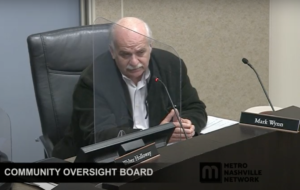
In May 2020, a grieving mother called the Metro Nashville Police Department. Her son had fatally overdosed, and she suspected foul play. She wanted the police department to look into it.
But an officer told her they don’t typically investigate overdoses. And the case was closed.
Months later, a detective told the mother it would have been best practice to investigate her son’s death and reopened the case. But by then, most of the evidence was gone. The surveillance footage at her son’s apartment had been deleted, and his phone had long passed the 72-hour time limit to be unlocked.
Now, the Community Oversight Board is considering an expanded approach to its investigations that could drastically change how police are disciplined: one that not only punishes officers for wrongdoing but that also holds their supervisors accountable for poor management.
The board voted last week to suspend the original officer assigned to the case for three days, for failing to properly investigate. But board member Mark Wynn says it’s important for higher-ups to be held accountable, too.
 Screenshot Courtesy Metro Nashville YouTube
Screenshot Courtesy Metro Nashville YouTubeCommunity Oversight Board member and former Nashville police officer Mark Wynn says both supervisors and officers should be held accountable for misconduct.
“Differential treatment of supervisors’ behavior in the ranks of a police department demoralizes the subordinates in that agency,” he said at the board’s monthly meeting.
Wynn spent more than two decades at MNPD, before retiring in 2001. He noted that supervisors have a responsibility to manage their subordinates and keep them out of trouble. In this instance, he said, a higher-ranking officer could have provided more information to the victim or reassigned the case to someone with more experience.
Wynn didn’t disagree that the officer should face discipline. But he worried letting the higher-ups off the hook could have a larger chilling effect.
“If the officers know that their supervisors get less punishment than they get, they’re less likely to walk into their office — their supervisors’ office — and make a complaint about misconduct,” Wynn said. “So, I know this is not the responsibility of this board to deal with the morale of the police department, but it matters for officers to know that they’re going to be treated as anybody else who does the same thing, no matter what the rank is.”
A recent WPLN News investigation found disparities in discipline at MNPD, with certain groups facing higher rates of severe punishment than others. Many current and former employees have told WPLN News about what they described as a toxic culture of unfair discipline that often protects the top brass and their friends.
In this case, the oversight agency will be opening an additional inquiry into the officer’s chain of command, to see if anyone else could have stepped in. This new approach could set a precedent in future cases.
“Something wasn’t done that should have been done in this investigation. They had ample opportunity to do it, and they didn’t,” Jill Fitcheard, executive director of Metro Nashville Community Oversight, said at the meeting. “This particular complainant will never know who was accountable for giving her son fentanyl.”

